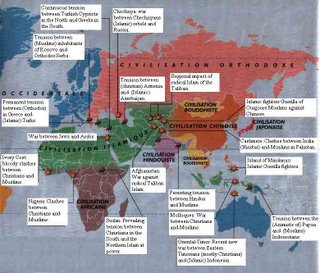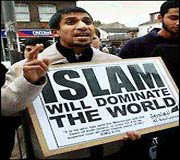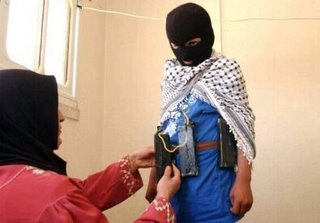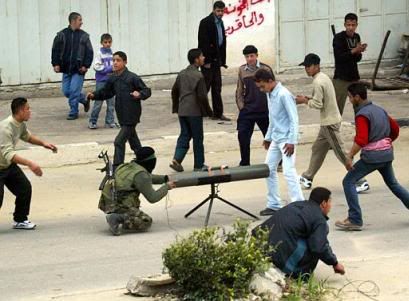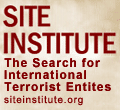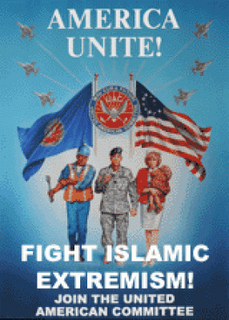Sunday, October 23, 2011
'Arab Spring': The chilly cruel winter reality of Arab racism and Islamic bigotry
'Arab Spring': The chilly cruel winter reality of Arab racism and Islamic bigotry Not that ethnic racism and religious bigotry weren't rampant before the so-called "Arab spring" sprung about. But the intolerance tide seems to be only worsening, and without an Arab dictator to "hold" various factions together, vulnerability expand, risks rise.
---
RELIGIOUS BIGOTRY:
As the D.B. puts it: "Violence Against Egypt's Copts in an Intolerant Arab Spring.. The elephant in the room of the Arab Spring is now the mistreatment of minority communities—Christians and others—across the Arab world."
FPM asks: Hillary Clinton Promises to Save Egypt's Christians? ... the guise of the "Arab spring" and "people-power," all hailed and supported by the U.S.—worked for religious minorities in the Arab world?
In Feb. Diana West wrote: "Islamic bigotry kept under wraps in Egyptian uprising." Especially at the brutalization and racist rape by Arab Muslim mob in Egypt of CBS journalist L. Logan (thinking she was Jewish) and the MSM silencing the story.
In May, the New York Times reported on the growing Islamic anti-Christian attacks: "Egypt's Christians Fear Violence as Changes Embolden Islamists." That "Coptic Christians, many of whom have felt less secure since Egypt's dictator stepped down, held a sit-in May 19 in Cairo."
Explaining: The revolution has empowered the majority but also opened new questions about the protection of minority rights like freedom of religion or expression as Islamist groups step forward to lay out their agendas and test their political might.
Adding:
Around the region, Christians are also closely watching events in Syria, where as in Egypt Christians and other minorities received the protection of a secular dictator, Bashar al-Assad, now facing his own popular uprising.
Z. Baumann, in a June article, asks about Christians: "Arab Spring's losers of revolution?"
Christian Persecution monitor (Aug.) "Common Fear, Opposing Reactions Define Differences between Christians in Egypt and Syria."
Later on, in that month:
Egyptian Islamic Jihad Official: If We Come To Power We Will Launch Islamic Conquest To Instate Sharia and "Exterminate" Christians If They Cause Problems.
The Copts Association and Christian of Iraq said (Sep.) The Arab Spring and Christian Persecution... Throughout the region, Christians have been targeted by Muslim mobs ... that the Arab Spring is posing a threat to Christian minorities throughout the Middle East.
As the Arab Islamic mob (Sep.) attacked the Israeli embassy in Cairo, they were justifiably described by a Western journalist. "They Were Animals." Still think, the Arab-Israeli conflict is about "land...?"
---
ETHNIC RACISM
Introduction:
From a 2006 article in The Guardian: "The race taboo,": The existence of racist attitudes within Arab countries is often denied, resulting in scandalous displays of prejudice against certain ethnic groups. The Arab countries, mostly are in denial. The A to Z of ethnic and religious groups in the Middle East embraces Alawites, Armenians, Assyrians, Baha'is, Berbers, Chaldeans, Copts, Druzes, Ibadis, Ismailis, Jews, Kurds, Maronites, Sahrawis, Tuareq, Turkmen, Yazidis and Zaidis (by no means an exhaustive list), and yet serious discussion of ethnic/religious diversity and its place in society is a long-standing taboo.
If the existence of non-Arab or non-Muslim groups is acknowledged at all, it is usually only to declare how wonderfully everyone gets along.
In April this year, indingenous group who suffer discrimination: Tunisia's Berbers test the limits of country's newfound freedoms
Probably most noted group of non-Arabs to suffer from Arab racism are blacks.
Already in March, Rebels execute black immigrants while forces kidnap others... Therefore the Arab racism of Libyan rebels constitute crimes against humanity.
From NER, March 10 "Arab Racism On Display In Libya."
From a Mar 5, 2011 "Black Africans Caught in Libyan Arab Racism" That Libyan rebels, overwhelmingly racist and anti-African...
The New York Times reported in September: "Libyans Turn Wrath on Dark-Skinned Migrants," That As rebel leaders pleaded with their fighters to avoid taking revenge against "brother Libyans," many rebels were turning their wrath against migrants from sub-Saharan Africa, imprisoning hundreds for the crime of fighting as "mercenaries" for Col. Muammar el-Qaddafi without any evidence except the color of their skin.
Explaining the scapefoating of black: Still, in a country with a long history of racist violence, it has become an article of faith among supporters of the Libyan rebels that African mercenaries pervaded the loyalists' ranks. And since Colonel Qaddafi's fall from power, the hunting down of people suspected of being mercenaries has become a major preoccupation.
Even the Arab-based Arab-biased al-Jazeera reported testimonies of "how race-based discrimination and violence, long an issue in Libya, had been inflamed by the war."
From the HuffingtonPost, September "The Great Taboo: Arab Racism," With the liberation of Libya come less happy reports from Amnesty and Physicians for Human Rights of rebels slaughtering scores of black Africans, believing they were all pro-Gaddafi mercenaries. While the dictator did hire some fighters from sub-Saharan Africa, the vast majority of black Africans in Libya are entirely innocent immigrants, one million of whom are guest workers.
Tarek Fatah (October) on "The future of the Arab Spring"
I'm very pessimistic about the Arab world... I think there will be far more chaos than Obama can manage. There's nothing there. The Muslim Brotherhood and the Islamists have billions of dollars. The jean-clad, western secularists have to worry about their girlfriends, and their New York Yankee hats and every silly stuff, and Twitter and Facebook. While the real world is moving on. All these guys will come back to New York, and Boston, and Toronto and say, 'Oh, we went there for sabbatical and had fun in Cairo.' While the Muslim Brotherhood is deeply entrenched. Not a single black face in all of Arab Spring. What does it say to you? 20% of the Arab population is black, but you can't see a single black face. It's a completely racist movement. It says non-Arabs in the Arab Spring have no rights. IF you're Bangladeshi, Filipino, Indonesian…you have absolutely no rights. This is worse Apartheid. That's why Africans are fleeing Libya, dying in the Mediterranean, to get to Italy or to Israel.
On the plight of Africans in Arab Egypt, UNHCR (October) says no more resettlement for refugees from Libya in Egypt... For the Africans now stranded in Egypt, Ali, a Somali refugee who has been waiting for nearly a decade to be relocated, he warns that there will be an upsurge in anti-Africanism and racism toward the refugees who are barred from work and education in the country.
Black activists in October decried: "Why The New York Times Ignored Libya Ethnic Cleansing... Not Genocide If "Our Team" Commits the Crime."
When a major newspaper supports so-called "rebels," even though the signs are abundant from the very beginning that they comprise sadistic killers, radical Islamists, and anti-Black racists, what does it do at the end of the day, when the evidence can't be hidden anymore that the so-called "liberators" are in fact genocidal killers?
[...] Complicity is widely shared. Not even the first African American president of the United States, Barack Obama, has condemned the targeted killings of Black Libyans. Not a word of condemnation from Hillary Clinton, Secretary of State, who is in Tripoli today. Nothing from United Nations Secretary General Ban ki-Moon and the ICC's Ocampo.
Carina Ray (Sep.): "Gaddafi and the Mercenary Myth." The mistreatment and murder of blacks by rebel forces in Libya is an extension of long-simmering anti-immigrant sentiments that are directed at sub-Saharan Africans. Xenophobia and racism are both at play here.
In that month: Persecution of Black Libyans draws international outcry
Workers World. They must protest the racist persecution of Black Libyans and all Africans and demand that it stop immediately.
A Sep. report: "Poverty Skyrockets in the World's Poorest Country Due to Racial Violence After Revolution in Neighboring Libya."
Niger is the poorest country in Africa and the world: Many of its people go hungry every day, many children die before their fifth birthday, and countless thousands have died in past famines. Now, it's getting much poorer, as black migrant workers from Niger are forced to leave neighboring Libya because of the color of their skin in the aftermath of the revolution there. Workers used to send money home to Niger from Libya, enabling impoverished family members to survive. But now these workers have been forced to leave Libya, where some black migrant workers were lynched, and many others have been rounded up and jailed in appalling conditions after being falsely accused of being mercenaries for the brutal, recently-ousted dictator Muammar el-Qaddafi...
Still, in a country with a long history of racist violence, it has become an article of faith among supporters of the Libyan rebels that African mercenaries...
Tags: apartheid, Arab apartheid, Arab racism, Arabism, Arabs, Berbers, Christians, discrimination, Egypt, ethnic, Gadhafi, gang rape, Islamic Apartheid, Islamic Bigotry, Islamism, Islamofascism, Jews, Kaddafi, Lara Logan, Libya, Middle East, Muslims, Qaddafi, racism, Tunisia
Labels: Arab racism, arab spring, Islamic bigotry
Sunday, July 03, 2011
The bloody: Hezbollah - Iran - Syria/Alawite - Hamas axis
Syria Crisis Offers U.S. Opportunity to Break Axis with Iran ...
www.cnsnews.com › News - 24 Jun 2011 – Satloff was referring to the longstanding alliance between Shi'ite Iran and Alawite-ruled, Sunni-majority Syria, the Hezbollah and Hamas ...
http://www.cnsnews.com/news/article/syria-crisis-offers-us-opportunity-break
Netanyahu: Gaza Blockade, Stopping Weapons Ships is Mandatory ...
17 Mar 2011
This is the axis of terrorism: Iran, Syria, Hezbollah, Hamas and the other terrorist organizations. This is the axis of terrorism in our ...
http://www.israelnationalnews.com/News/News.aspx/142950
How Syria's Uprising Threatens Hizbullah - Randa Slim (Foreign Policy - May 3, 2011)
The popular uprisings in Syria represent the most serious challenge to Hizbullah since the 2006 war with Israel.
A regime change in Syria would threaten a major arms supply route to Hizbullah; deny the Iran-Syria-Hizbullah-Hamas axis its Arab linchpin; weaken Hizbullah's deterrence capacities vis-a-vis Israel; and deny Hizbullah leaders and their families a safe haven when they feel threatened by Israel, as was the case in 2006.
In a recent round of interviews I conducted with Hizbullah officials in Beirut, all those I spoke to agreed that a regime change in Syria would not occur easily or peacefully.
So far, Hizbullah officials believe that Bashar al-Assad will survive.
http://mideast.foreignpolicy.com/posts/2011/05/03/hezbollah_s_most_serious_challenge
---
More of: Alawites-Hezbollah-Iran-Syria bloodshed in Lebanon
At least 6 people are killed in sectarian clashes in Lebanon - Panorama.am
14:37 18/06/2011
Gunmen from Sunni Bab al-Tabbaneh district and Alawite neighborhood of Jabal Mohsen, Tripoli, Lebanon have clashed on Friday, "Radio Liberty" reports.
According to the source, at least 6 people are recorded to be killed in the aftermath of severe clashes.
Residents from the two districts have clashed intermittently in recent years, but Friday's incident came amid heightened tension over the widening popular uprising against Syrian President Bashar Assad. Jabal Mohsen is the stronghold of the pro-Syria Arab Democratic Party, led by Ali Eid.
http://www.panorama.am/en/society/2011/06/18/libanan/
Sectarian Clashes Erupt in North Lebanon - Al-Arabiya
http://english.alarabiya.net/articles/2011/06/18/153829.html
Child killed in renewed clashes in north Lebanon - Ya Libnan
http://www.yalibnan.com/2011/06/17/child-killed-in-renewed-clashes-in-north-lebanon/
Kabbara says Assad's "thugs" targeted Tripoli's Bab al-Tabbaneh
NOW LEBANON - Jun 22, 2011
Future Bloc MP Mohammad Kabbara said on Wednesday that Friday's Tripoli clashes are directly linked to current Syrian events. Syrian President Bashar al-Assad's "Shabeeha" (thugs) attacked the rally held in Bab al-Tabbaneh in support of anti-regime ...
http://www.nowlebanon.com/NewsArticleDetails.aspx?ID=284546
Seven people charged in northern Lebanon clashes Ya Libnan
http://www.yalibnan.com/2011/06/21/seven-people-charged-in-northern-lebanon-clashes/
Hezbollah weapons used in north Lebanon clashes, report Ya Libnan
June 20, 2011
March 14 MP Hadi Hobeich said on Monday that weapons backed by Hezbollah were used in the clashes that broke out on Friday in the city of Tripoli in northern Lebanon
"The data points toward Hezbollah-backed arms that were distributed in Tripoli," the MP told the Voice of Lebanon
In a reference to Hezbollah, Hobeich said that "there is a party that is armed and that is distributing weapons to everyone."
"We only benefit by having security across the country," he added, voicing hope that the newly formed Lebanese cabinet will work on "disarming all Lebanese, including Hezbollah."
He said that only the Lebanese government should have the authority to use weapons.
Armed clashes erupted in Tripoli on Friday following a rally in support of Syrian protesters. The military official of the Hezbollah and Syrian backed Arab Democratic Party, Ali Fares was killed and 6 others including one army soldier and a seven year old child. At least 59 others were reportedly injured and some are in serious condition .
Many analysts questioned why the Alawite party should have a military official.
Jabal Mohsen ( home of the Arab Democratic Party) and Bab al-Tabbaneh areas have been in recent years the scene of intense clashes between Sunni supporters of Lebanon's former PM Saad Hariri and Alawites who are loyal to the Hezbollah-led coalition backed by Iran and Syria.
http://www.yalibnan.com/2011/06/20/hezbollah-weapons-used-in-north-lebanon-clashes-report/
Why Hezbollah Had a Really Bad Week David Schenker July 1, 2011 12:00 am
Why America Should Be Hoping Bashar Assad Gets Overthrown Meet the Women of Hezbollah Back in 2006, the Lebanese Shiite militia Hezbollah was riding high. Having fought the Israeli army to a standstill, the organization's leader Hassan Nasrallah declared "divine victory." The war was a public relations coup for the militia, which emerged from the campaign as the most favorable personification of Shiism in the largely Sunni Muslim world. So impressive was the alleged victory that the campaign sparked a widely reported trend of conversion to Shiite Islam in the region. But if 2006 was a divine victory, this week's Special Tribunal on Lebanon (STL) indictments of four Hezbollah officials and affiliates in connection to the February 2005 assassination of former Lebanese premier Rafiq Hariri, may prove a divine defeat.
While the first reports of a Hezbollah role in the assassination of Hariri surfaced some two years ago, the formal announcement of the indictments will likely serve as an exclamation point to a longer process of depreciation in the group's reputation that started in 2008, when the organization invaded and occupied Beirut, turning the weapons of "the resistance" on the Lebanese people. That depreciation continued through 2009, when the organization's chief financier was arrested in a Bernie Madoff-like Ponzi scheme. More recently, in an ironic twist, Hezbollah—which at one time was known as the "Party of the Oppressed"—has emerged as the strongest regional backer of Syria's murderous Assad regime. Straining credulity, Nasrallah himself has now given two speeches vouching for Assad's pro-reform bona fides.
Now, for an organization that has long described itself as "the Resistance" to Israel, the revelation that it also specializes in killing Sunni Muslims will, at a minimum, be problematic. Although Nasrallah has spent the better part of the past two years trying to discredit the tribunal, few in the largely Sunni Muslim Middle East will question the court's accusation that the militia played a central role in the murder of Hariri, the leader of Lebanon's Sunni community.
Indeed, the Arab Spring has contributed to a spike in Sunni-Shiite tensions. Pro-democracy demonstrations in Bahrain, for example, were largely seen by Gulf Arabs as an attempt by the Shiite theocracy in Iran to subvert the Sunni monarchy. In Syria, meanwhile, the rallying cry of the largely Sunni Muslim opposition to the Alawite Assad regime has been "No to Iran, No to Hezbollah!" Given these sentiments—and despite the residual respect for the accomplishments of the organization—the indictment will likely be seen through a largely sectarian prism.
Moreover, the accusations are bound to foment discontent within Nasrallah's organization, and potentially result in some diminished support for the militia in Lebanon. While they will not come as a shock to anyone, of course, they will reopen old wounds, enraging Lebanon's Sunni Muslims and, perhaps, disillusioning a few of Hezbollah's Christian allies. At the same time, some Shiites—Hezbollahis and the organization's constituents—will likely view the indictments as a liability and may seek to provoke another conflict with Israel, a la 2006, to distract attention from the tribunal. But regardless of Nasrallah's bravado, Shiites in south Lebanon do not crave another costly war with Israel or a return to civil war at home.
To be sure, notwithstanding the indictment of four of its lieutenants, Hezbollah will remain firmly in control of Lebanon, both politically and militarily. But the organization's stature in the wider Muslim world will be irrevocably diminished and the change in status of this once seemingly holy Shiite organization will likewise further undermine the position of Iran and Syria in the region. It could also undermine Hezbollah in the eyes of Europe, where the militia has long benefitted from the Continent's inexplicably tolerant view of the group's "political" wing. Indeed, given the European Union's expressed disgust with the ongoing atrocities perpetrated by the Assad regime and its growing frustration with the clerical regime in Tehran, the EU might be inclined to shift its views and finally lump Hezbollah in with these irredeemable regimes.
Until then, despite United Nations Resolutions calling for Lebanon to render the indicted individuals, it is all but certain Hezbollah won't cooperate with the Special Tribunal. But while the trigger men themselves may slip the noose and be tried by the STL in absentia, the Shiite militia and its sponsors that ordered the Hariri hit will pay a steep price. Indeed, there may or may not ultimately be a conviction in The Hague, but in the Middle East court of public opinion, the verdict on Hezbollah will be guilty.
David Schenker is Aufzien Fellow and director of the Program on Arab Politics at the Washington Institute for Near East Policy.
http://www.tnr.com/article/world/91167/lebanon-tribunal-hariri-hezbollah
Labels: arab apartheid, arab spring, Hamas, Hezbollah, Lebanon, Syria
Wednesday, June 29, 2011
Arab Spring Gusher / The Arab apartheid system is exposing itself
Northumberland Today - Wally Keeler - [June 28, 2011]
Arabs take to the streets in the hundreds of thousands. They have suffered suppression, oppression, repression, for generations of family dictatorships. Security forces machine-gun the 'flowering popular movement.' Tanks and howitzers shell the residences of the 'flowering popular movement.' Mourners are gunned down, children are tortured and murdered, dissidents decapitated or mutilated. Women are gang raped. Refugees by the thousands flee. Tens of thousands are homeless. Islamist buzzards circle over the political chaos. The Arab apartheid system is exposing itself.
http://www.northumberlandtoday.com/ArticleDisplay.aspx?e=3191144
Labels: arab apartheid, arab spring

